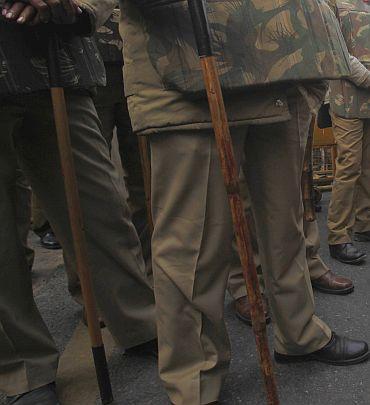 Rediff.com's Priyanka caught up with five girls who underwent a traumatic experience at the Parliament Street police station on the day several anti-rape protestors were roughed up at Raisina Hill. Unnerved, the girls re-grouped and took part in Thursday's protest rally.
Rediff.com's Priyanka caught up with five girls who underwent a traumatic experience at the Parliament Street police station on the day several anti-rape protestors were roughed up at Raisina Hill. Unnerved, the girls re-grouped and took part in Thursday's protest rally.
I don't even want to look at the police," says Megha, a young insurance company employee who was part of a protest rally in the national capital on Thursday evening along with 500-odd demonstrators.
The demonstrators, mostly comprising college students and young professionals, marched towards India Gate from Nizamuddin demanding justice for rape victims and shouting slogans like Hum honge kamyab (we shall overcome). They were, however, stopped well short of their destination by the Delhi police which had barricaded the road leading to the monument.
The police kept a safe distance. But Megha had already turned her back on them.
The sight of police personnel makes her feel sick now.
Megha was one of the 16 girls who were reportedly 'wrongfully detained' at the Parliament Street police station on the evening of December 25 when the police resorted to lathicharge at Raisina Hill.
Standing with Megha were four other girls -- Nikita, Shambavi, Reema and Usha Saxena -- all of whom underwent the traumatic experience at the police station that evening.
After being denied access to India Gate, a few hundred people had gathered at Jantar Mantar on December 25, and were protesting peacefully. A little after 4.30 pm they came to know that few of the girls, who had been protesting, had been taken to the police station.
The girls grew anxious and wanted to know about their fellow protestors.
A group of eight girls then approached the Parliament Street police station. They asked the constables present why their friends were being kept there.
"We wanted to help our fellow protestors. We asked them how could they keep girls in a police station like this. We asked which law allows it," recalls Nikita, 23, a lawyer.
According to her, the girls were being detained in a room that appeared to be a store room.
"It was like store room or a spare room; things were lying around carelessly," observes Nikita.
Station in-charge Dinesh Kumar entered the room and allegedly started shouting at the girls.
"He shouted: Bahar karo in sabko (push out all of them)," says Nikita.
"The entire incident must have been recorded on CCTV cameras at the station," she observes.
"The police officer pushed the lady constables, who fell on us," says Usha Saxena, who works as a manager with Greenpeace.
And that is when the physical violence against the girls unfolded, right before her eyes.
"I was pulled by my hair," Megha recalls.
"She has not even tied her hair after that," her friend added jokingly.
"I was angry and terrified for the girls," Usha said.
The youngest of all, Shambavi, 19, a college student at LSR, was accompanied by her mother.
"They pulled my hair and threw me against the wall," says Shambavi.
Shambavi, an avid Twitter user, posted messages continuously about how they were being treated at the police station. She posted almost 20 tweets narrating the incident, which lasted for about two hours.
They allege that the police officers asked them to submit personal information, names and phone numbers at the police station. They refused to do so.
"We were so scared. We just gave them fake names," says Usha.
Meanwhile, a smear campaign had already begun stating that the twitter posts made by Shambavi were not genuine.
"Everybody got to know what was happening inside because I was constantly tweeting. But if somebody had called, they wouldn't know if I was there because we gave fake names to the police," she explains.
The girls managed to leave the police station around 6.40 pm.
"I had also tweeted about it," Shambavi adds.
The five girls re-grouped again on Thursday and marched from Nizamuddin.
"We will continue to protest. We will not let this movement die," Usha said.










 © 2025
© 2025